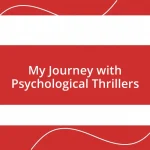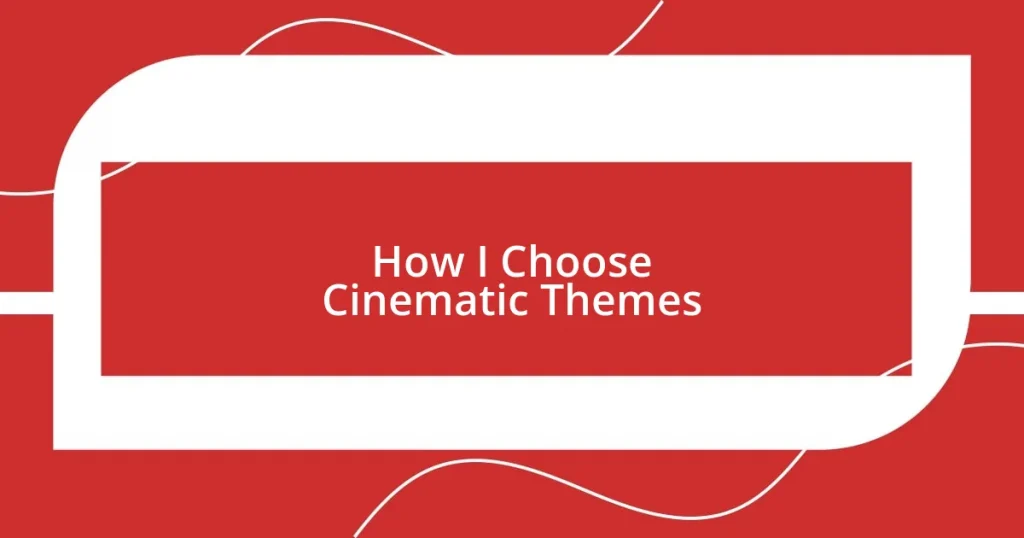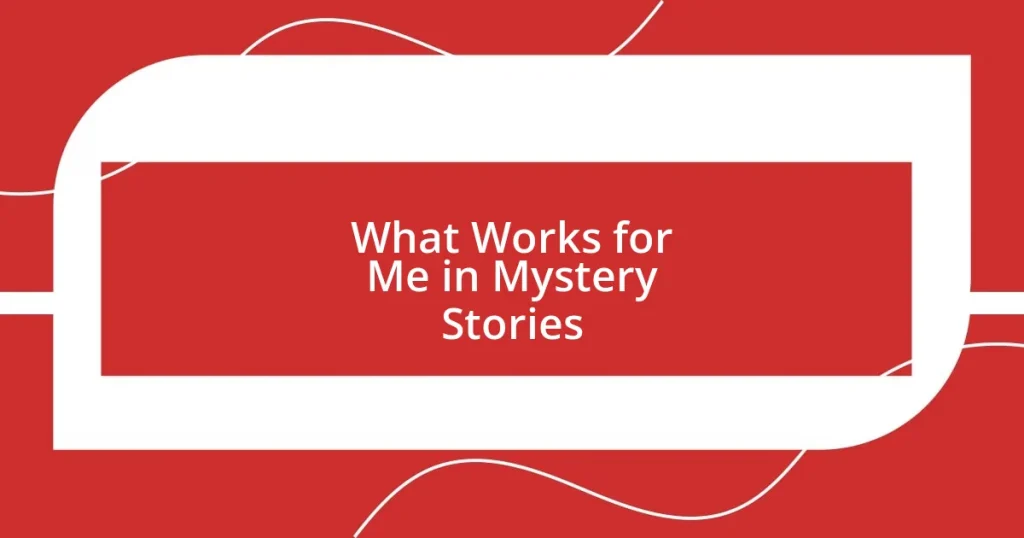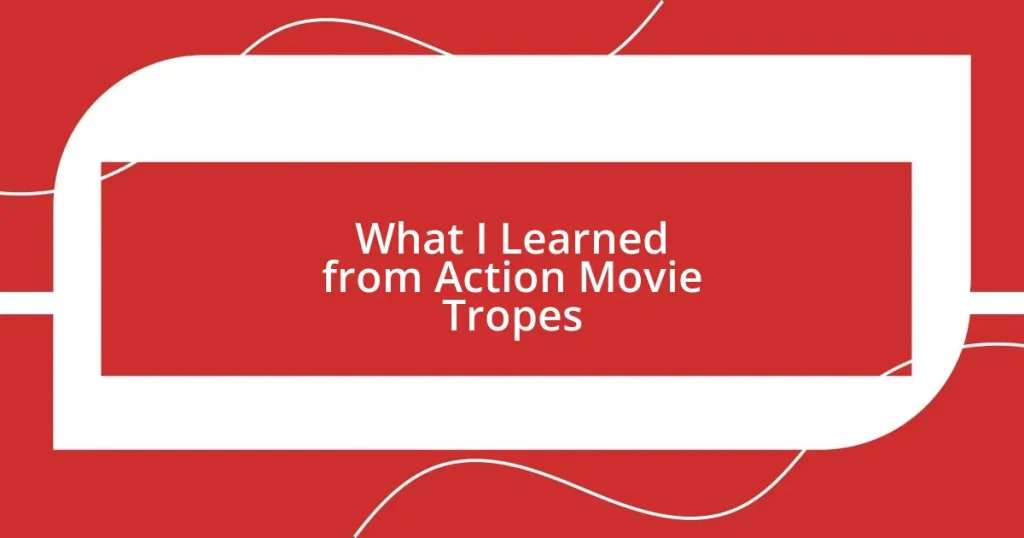Key takeaways:
- Understanding cinematic themes enhances viewer connection and engagement, allowing reflection on personal experiences.
- Personal interests and emotional states significantly influence the themes one resonates with in films, highlighting the connection between life experiences and cinematic narratives.
- Exploring different film genres reveals how various themes can approach similar human issues, deepening emotional understanding and appreciation.
- Effective implementation of themes in projects involves thoughtful character arcs, dialogue, and music to create impactful emotional experiences for the audience.
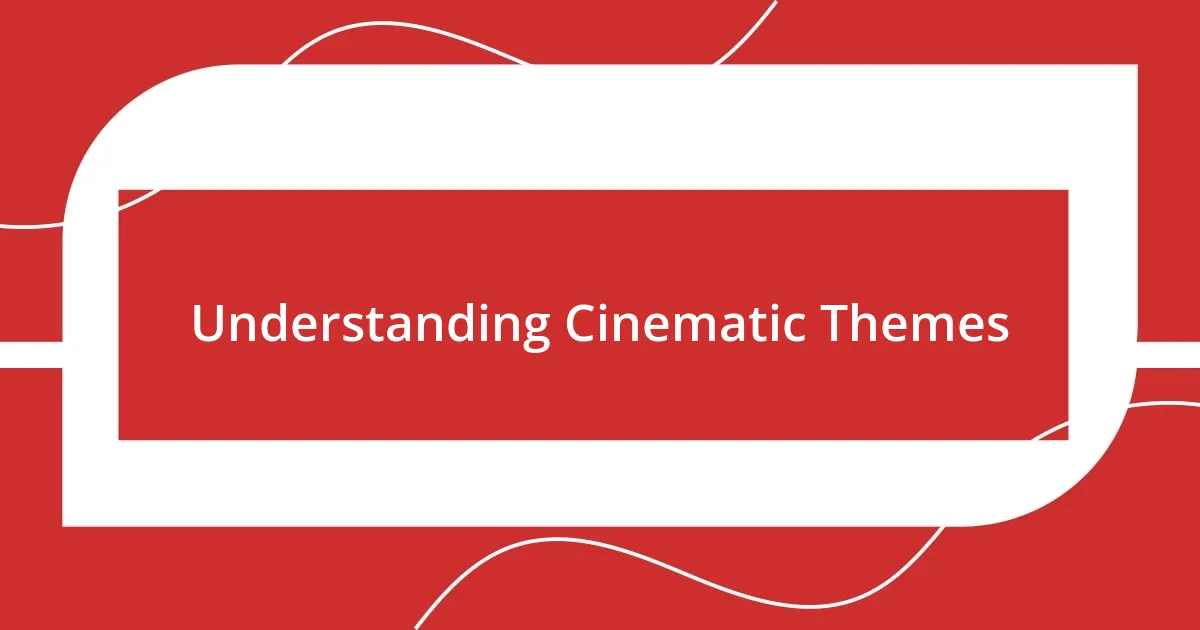
Understanding Cinematic Themes
Cinematic themes are the underlying messages or ideas that give depth to a story, resonating with audiences on various levels. I remember watching The Pursuit of Happyness and feeling a wave of emotions as it highlighted the theme of resilience against adversity. It made me ponder: have you ever faced a challenge that tested your spirit?
When I dive into a film, I often seek out these themes to understand the filmmaker’s perspective. For instance, in Eternal Sunshine of the Spotless Mind, the theme of love and memory struck a chord with me, prompting reflections on my own relationships and the fleeting nature of happiness. There’s something incredibly powerful about how these themes can mirror our own experiences, don’t you think?
Understanding these themes also helps me appreciate narrative complexity. A great film can weave many themes together, creating a richer tapestry that evokes diverse interpretations. I find myself asking, how does this theme shift my perception of the characters? Exploring this makes me feel more connected to the story, allowing me to engage in a true dialogue with the film itself.
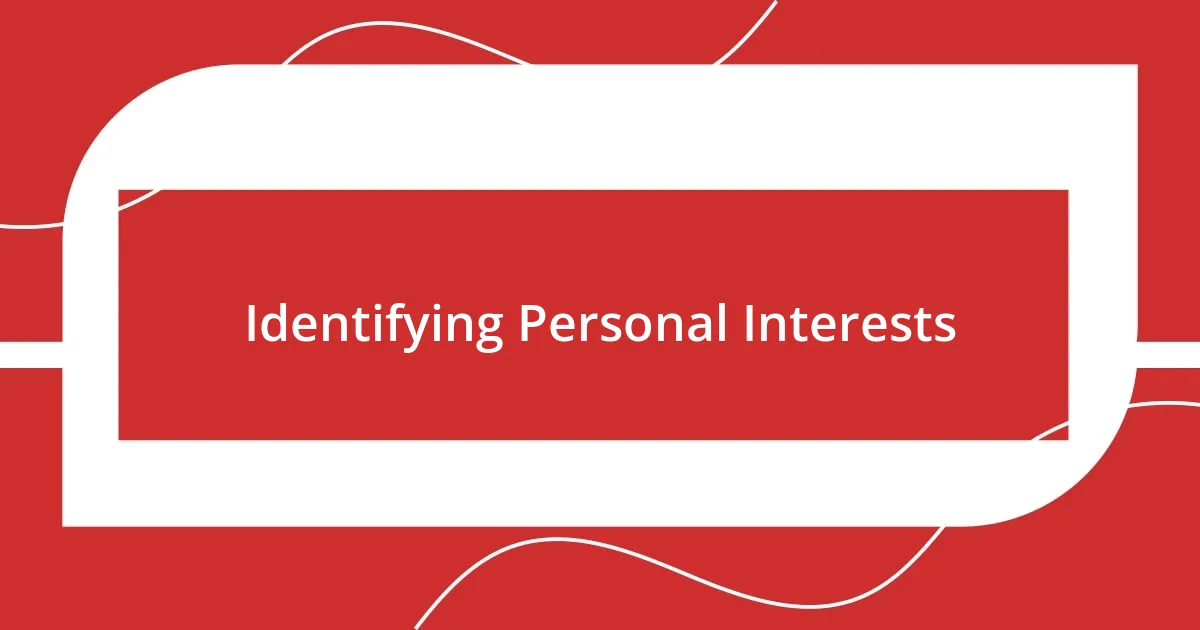
Identifying Personal Interests
Identifying personal interests can significantly influence the themes I gravitate toward in films. I remember a phase in my life where I was particularly fascinated by stories of overcoming trauma. I found myself drawn to movies like A Beautiful Mind, which explored mental illness and the triumph of the human spirit. This connection between my experiences and the films I chose made each viewing more impactful—almost like they were guiding me through my own journey.
As I reflect on the films that resonate with me, I realize that my interests often correspond to my current emotional state. For example, during a time of upheaval, films that featured themes of adventure and self-discovery, such as Wild, became my escape. I can’t help but wonder if many people experience this, seeking out stories that offer reassurance or inspiration when facing life’s uncertainties. What themes do you find yourself gravitating toward during different life moments?
Another aspect I consider is how my passions—like music and literature—influence my cinematic preferences. I find that films that incorporate rich soundtracks or literary references, such as La La Land, resonate deeply with me because they capture the essence of my hobbies. It’s a reminder of how interconnected our interests can be, shaping not only the films we love but also how we interpret their themes.
| Personal Interests | Related Cinematic Themes |
|---|---|
| Overcoming Trauma | Resilience and Strength |
| Adventure and Self-Discovery | Exploration and Identity |
| Music and Literature | Artistic Expression and Passion |

Researching Film Genres
When researching film genres, I’ve discovered that diving into their unique characteristics can transform my viewing experience. For instance, my appreciation for horror films grew when I learned about their use of suspense and fear to evoke emotional reactions. I still remember the first time I watched The Shining—an overwhelming blend of psychological tension and supernatural elements left me pondering how much the genre can manipulate human emotions.
Here’s a quick list of various film genres and their typical themes:
– Romance: Love and relationships, often intertwined with sacrifice and longing.
– Science Fiction: Exploration of the future and the unknown, questioning humanity’s place in the universe.
– Documentary: Real-life stories, providing insights into social issues or historical events.
– Comedy: Humor and absurdity, often reflecting societal norms and personal quirks.
– Action: Heroism and conflict, showcasing the battle between good and evil through adrenaline-pumping sequences.
By exploring these genres, I find myself drawn to certain themes that resonate with my own life experiences. It’s enlightening to see how different genres approach similar issues, which encourages me to connect on a deeper emotional level.

Analyzing Successful Films
Analyzing successful films often requires peeling back the layers of their themes. I remember watching The Social Network and being struck by how it delved into ambition and betrayal in the tech world. These themes felt profoundly relevant, particularly as I navigated my career aspirations, leading me to ask: How do our personal ambitions influence our interpretations of cinematic narratives?
In film analysis, I pay close attention to the cultural and societal contexts that shape a story. For example, films like Parasite illustrate class struggle in a captivating way that resonates globally. After watching it, I couldn’t help but reflect on my own experiences with economic disparity. It’s fascinating how these narratives can highlight societal issues while prompting us to confront our own beliefs and experiences.
Moreover, I find that successful films often invoke a strong emotional response because they connect with universal human experiences. Take The Pursuit of Happyness, for instance; it perfectly encapsulates the theme of perseverance. Watching it, I felt a surge of hope, reminding me of the times I’ve faced struggles. Are we not all drawn to stories that inspire us to keep moving forward against the odds? It’s this blend of emotional resonance and thematic depth that keeps me engaged as a viewer.
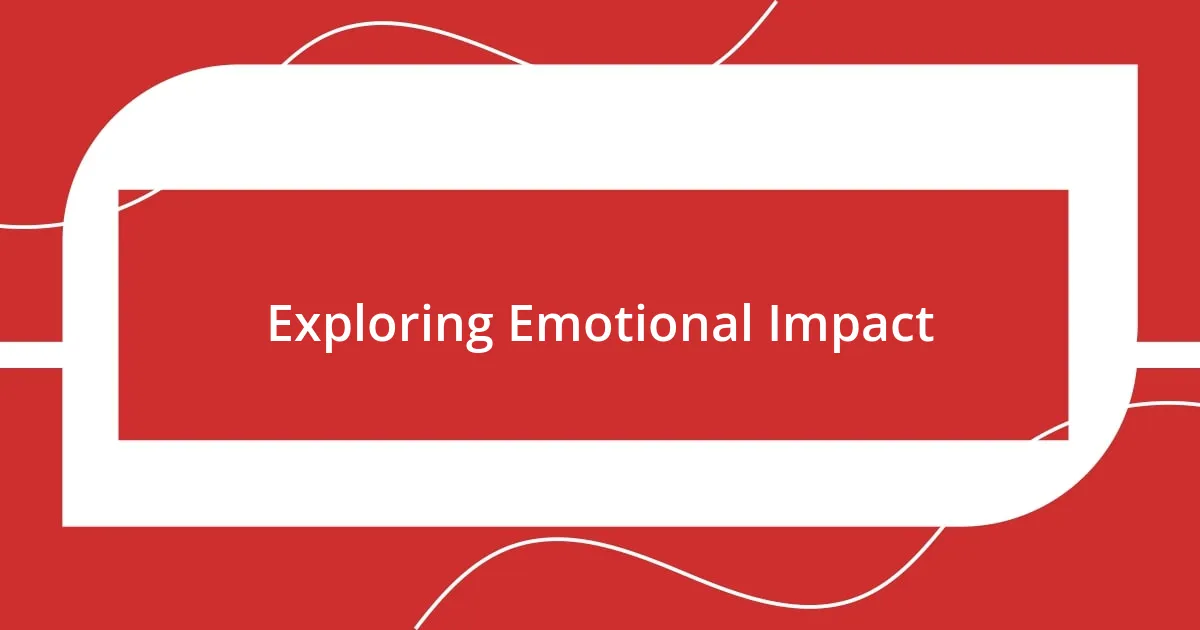
Exploring Emotional Impact
Exploring the emotional impact of films often leads me to reflect on my own life experiences. For instance, after watching Eternal Sunshine of the Spotless Mind, I found myself contemplating the complexities of love and loss. The film’s examination of memory and its influence on relationships made me think about the moments I’ve tried to either forget or hold onto, adding layers to my understanding of how emotions shape our decisions in life.
I’ve noticed that certain films create an emotional ambiance that stays with me long after the credits roll. Watching Grave of the Fireflies was a heart-wrenching experience; the theme of sibling love amidst the horrors of war resonated deeply within me. It reminded me of my bond with my sibling and the lengths we go to support each other in tough times. Have you ever watched a film that felt like a mirror reflecting your own emotions?
Furthermore, I believe that films can also serve as a form of catharsis. After experiencing loss, Coco offered me a vivid exploration of memory, family, and the celebration of life. As I watched the protagonist seek to reconnect with his ancestors, I felt a wave of comfort wash over me. It’s incredible how animated stories can tap into profound emotions, encouraging us to embrace our past while looking forward. How do you feel when a film encapsulates an emotion you’ve grappled with?
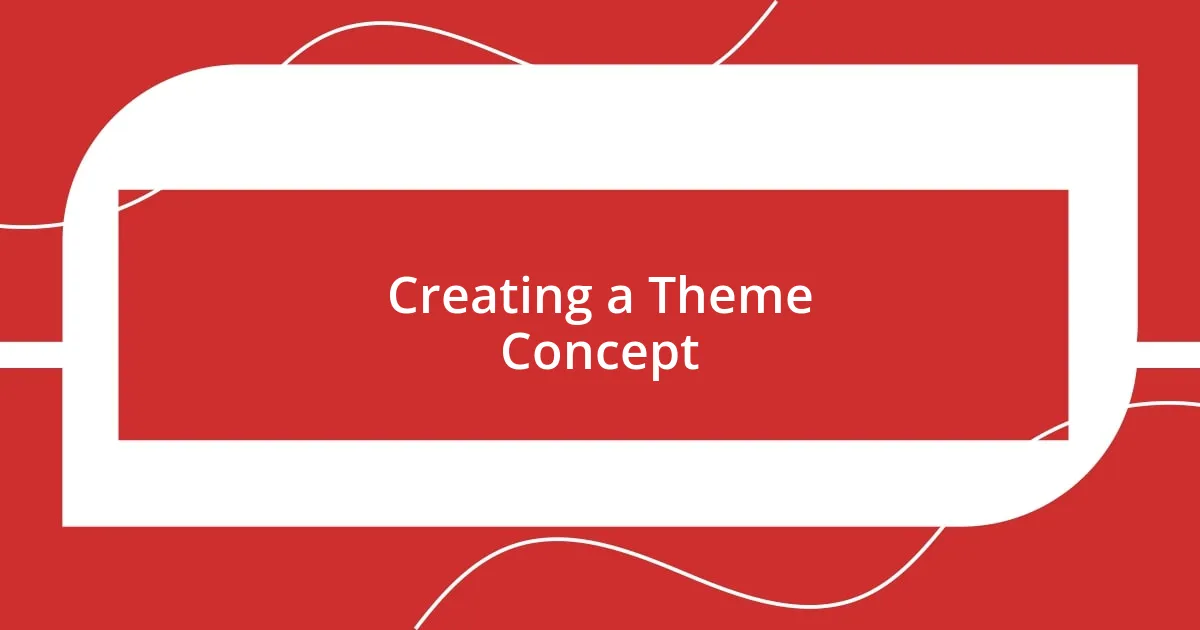
Creating a Theme Concept
Creating a theme concept starts with identifying the core message that resonates with both the filmmaker and the audience. When I brainstorm ideas for a film’s theme, I often consider my own beliefs and experiences. For instance, I once explored the theme of healing in one of my projects, inspired by my journey through personal growth after a challenging period. How do our own experiences shape what we want to convey through storytelling?
Once I hone in on a central theme, I focus on how to weave it throughout the narrative. I remember working on a script where the theme revolved around the impact of decisions on one’s life path. Each character’s choices were designed to reflect how small, seemingly insignificant decisions can snowball into life-altering outcomes. This layered approach not only created depth but also engaged the audience: don’t we all wonder how different our lives might be if we’d made other choices?
Moreover, I find the visual representation of a theme vital to creating a cohesive concept. In one of my projects, I used a color palette that reflected the theme of isolation. Shades of blue and grey dominated the scenes, drawing viewers into the protagonist’s emotional state. This choice sparked conversations among audiences, prompting them to reflect on their own feelings of seclusion. Isn’t it intriguing how visual elements can enhance our understanding of a theme?

Implementing Themes in Projects
Implementing themes in projects is where the magic truly happens. For example, during a recent short film project, I chose the theme of resilience. I incorporated character arcs that showed the struggle against adversity and moments of triumph. I’ll never forget how a simple scene of a character getting up after a fall resonated with viewers, prompting them to share their own stories of overcoming challenges. Isn’t it fascinating how a single moment can spark such a powerful connection?
There’s something special about integrating thematic elements into dialogue. In another project, I crafted conversations that reflected the theme of betrayal. The characters navigated their relationships with carefully chosen words, each line loaded with subtext. I remember watching an audience react during a pivotal moment: gasps of recognition and a shared sense of discomfort when they felt the weight of those betrayals. Have you ever observed how words can hold a mirror up to our own experiences?
Moreover, the use of music can greatly enhance a theme’s impact. In one project, I strategically selected music that echoed the feelings of longing and nostalgia. Composing a scene with a haunting melody created an atmosphere that lingered long after the viewing. I noticed how audience members would leave humming the tune, as if it encapsulated their emotions and memories. How powerful is it when sound deepens thematic resonance?





